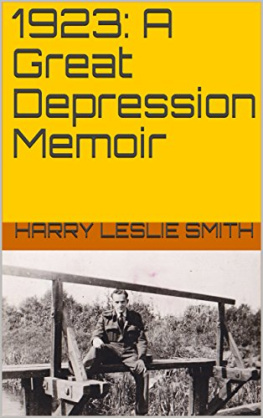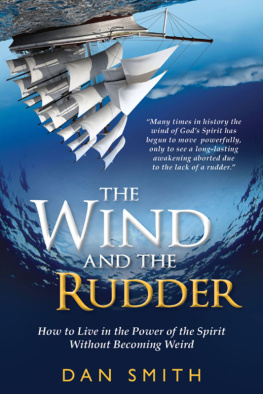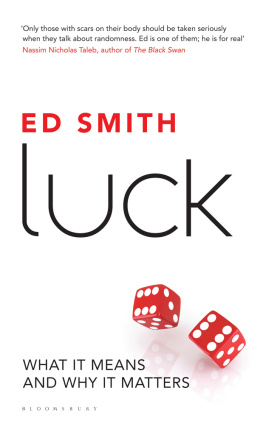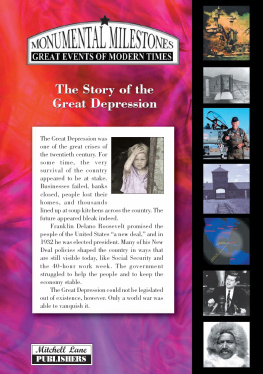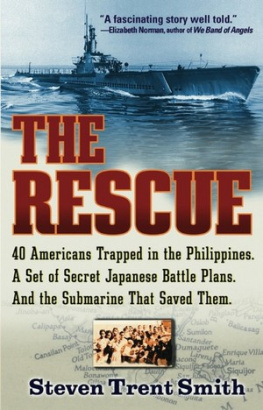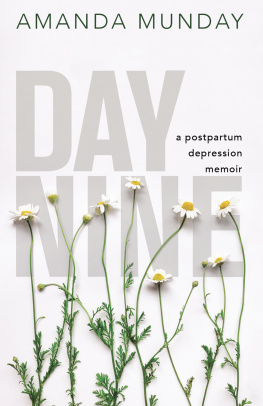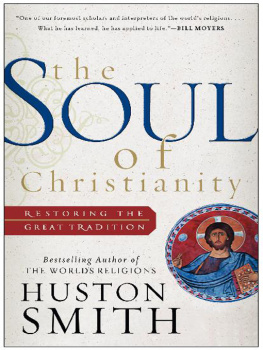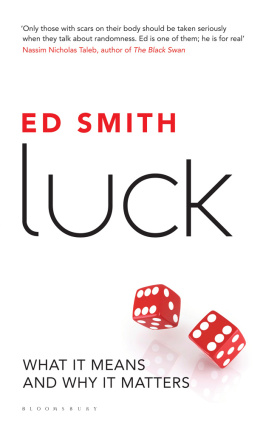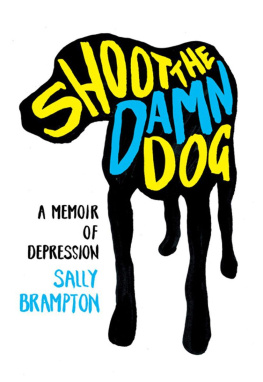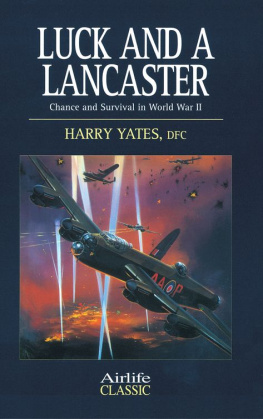Smith - 1923: A Great Depression Memoir
Here you can read online Smith - 1923: A Great Depression Memoir full text of the book (entire story) in english for free. Download pdf and epub, get meaning, cover and reviews about this ebook. year: 2010;2011, publisher: iUniverse, genre: Non-fiction. Description of the work, (preface) as well as reviews are available. Best literature library LitArk.com created for fans of good reading and offers a wide selection of genres:
Romance novel
Science fiction
Adventure
Detective
Science
History
Home and family
Prose
Art
Politics
Computer
Non-fiction
Religion
Business
Children
Humor
Choose a favorite category and find really read worthwhile books. Enjoy immersion in the world of imagination, feel the emotions of the characters or learn something new for yourself, make an fascinating discovery.
- Book:1923: A Great Depression Memoir
- Author:
- Publisher:iUniverse
- Genre:
- Year:2010;2011
- Rating:4 / 5
- Favourites:Add to favourites
- Your mark:
- 80
- 1
- 2
- 3
- 4
- 5
1923: A Great Depression Memoir: summary, description and annotation
We offer to read an annotation, description, summary or preface (depends on what the author of the book "1923: A Great Depression Memoir" wrote himself). If you haven't found the necessary information about the book — write in the comments, we will try to find it.
Smith: author's other books
Who wrote 1923: A Great Depression Memoir? Find out the surname, the name of the author of the book and a list of all author's works by series.
1923: A Great Depression Memoir — read online for free the complete book (whole text) full work
Below is the text of the book, divided by pages. System saving the place of the last page read, allows you to conveniently read the book "1923: A Great Depression Memoir" online for free, without having to search again every time where you left off. Put a bookmark, and you can go to the page where you finished reading at any time.
Font size:
Interval:
Bookmark:
1923: A Great Depression Memoir
Harry Leslie Smith
1923: A Great Depression Memoir
Copyright @ 2011 Harry Leslie Smith
All rights reserved. No part of this book may be used or reproduced by any means, graphic, electronic or mechanical, including photocopying, recording, taping or by any information storage retrieval system without the written permission of the publisher except in case of brief quotations embodied in critical articles and reviews.
Barley Hole Press
Sydney Street,
Belleville, Ontario, Canada
K8P 4Y1
www.1923thebook.ca
ISBN: 978-0-9878425-0-3 (sc)
ISBN: 978-0-9878425-1-0 (ebook)
Printed in the United States of America
Contents
About the Author
Harry Leslie Smith is a survivor of the Great Depression, a Second World War RAF veteran and, at 91, an activist for the poor and for the preservation of social democracy. Harry Leslie Smith is a frequent contributor to the Guardian Newspaper. His articles about politics and the decline of the social safety network in western democracies have become viral sensations on social media platforms. Some of his Guardian articles have been shared over 60,000 times on Facebook and attracted huge comment and debate. He has authored numerous books about Britain during the Great Depression, the Second World War and post-war austerity. He lives outside Toronto, Canada and in Yorkshire.
Harry Leslie Smith is represented by Londons Greene and Heaton. His latest book Harrys Last Stand is published by Icon Books and available June 2014. For further information about the author and his life please visit www.1923thebook.ca
Gentle Reader:
I am now ninety and my death approaches with actuary punctuality. I have lived longer than any of my ancestors. My body grows weary, through decades of use and abuse and the party is almost over for me. Yet I still long for one more adventure, one more glorious sunrise; one more chance to toss the dice and see what fate unfolds for me. As I now survey my long life; I realize that there was remarkable beauty, sorrow, and humour in my long journey from boyhood to vintage maturity. The voyages taken by my ancestors and myself should not be lost to history. Those episodes of my youth, painful, sad, and absurd as they were, are worthy of being remembered.
I ask for your indulgences while reading this ever-so-brief tale of my younger days. I have forgotten much, and with the onset of time some past names and places are now obscure to me. Should you find a passage in this tome that plays falsely against your ear, blame it on the misty memory of an old man. I leave this book to you as a tribute to my tribe because I am the last of my kind and no one else is left alive to tell this tale. I am the first and last son who can recall our passing across this spectre, this enchanting world we all leave too soon.
Prologue
My sister and I were children of the one true Church, which took its orders from the Vatican. We were commanded by Gods Earthly representatives to arise early each Sunday and dress in clean, presentable clothes. After a breakfast of stale toast, my sister would clean my face and hands with an old dishrag. Until the age of six, I had been excluded and shielded from paying homage to Jesus, snug in His heaven. So, it mystified and frustrated me to have to stomp across city streets with stores shuttered and bolted on the Sabbath. I was envious of our towns well-fed but less devout brethren, who were still wrapped up warm in their beds while my sister and I traversed to the parish cathedral.
In front of St. Josephs, we lined up with the other hungry children from our school and from other parochial establishments in the parish. We formed neat lines and rows designated by age and classroom. Nuns from the Sisters of the Cross and Passion barked up and down the street like sergeant majors at inspection. They pulled and dragged sleepy-eyed worshippers into their correct drill formation. Nuns in wimples wearing long black gowns, impenetrable to human emotions and suffering, demanded silence from us and ordered us to demonstrate our reverence for the Holy Father and for the Church through our absolute obedience.
Before mass, I waited impatiently to be marched into the confessional where I could reveal my sins. Father, forgive me, it has been seven days since my last confession and I have had ravenous thoughts about my pudding for tea.
Absolution never came to me or to any of the other poor wretches I knew in my childhood during the Great Depression.
But now, at the age of twenty-two, I dont give a toss for the church or forgiveness because it is May 1945 and the Second World War is coming to its brutal and bloody conclusion. I have a front row seat to Nazisms turgid end because I am part of a military convoy that is making its way from Holland to the city of Hamburg. Before me, the landscape of Europes lowlands is pitted and scarred from merciless battles fought by giant armies who have done their best to destroy civilized society.
As our fleet of RAF lorries trundle along a dual carriage way, we brush past an endless procession of refugees fleeing in the opposite direction. They are jetsam from over five years of total war. I am told by a superior officer that those sad creatures walking on the side of the road are a mixture of forced labourers, former concentration camp inmates, and the Diaspora, from Germanys eastern provinces. Their eyes are cast down and their feet stamp towards a dirty, dusty unknown destination
I turn away from the refugees and feel the warm spring air caress my face; it smells of fresh earth, petrol, and newly blossomed flowers. A hundred kilometres north, Soviet infantry and stray remnants of Wehrmacht divisions are still fighting. The German army is making a final push westward in a vain attempt to surrender to America or Britain rather than face retribution from the Russians. Who can blame them because Hitler is dead and Berlin has fallen to Red Army forces that have pitched their flag on the smouldering Reichstag and began to seek their blood vengeance for the crimes committed against their countrymen, during this inhuman war.
As we approach Hamburg, a Players cigarette dangles from my mouth and the strap to my tin helmet hangs loosely around my chin and I think this is what Carthage must have looked like to the Romans after they laid waste to it. At the sides of the road, a few members of the defeated master race watch me, until a horn is sounded and then like frightened dogs they scurry back into the rubble.
I feel nothing for the defeated Germans as I survey the crumbling brick skeletons and the grey ghosts of buildings from the back of my RAF lorry. I have been through Holland and Belgium and seen Germanys legacy; smashed cities, murdered families and emaciated children. I have seen both the corpses of national socialist collaborators and German army deserters hung from trees. I have seen mobs do justice in the streets to those who benefited under Nazi rule.
I have seen enough in my short life and now I have no feelings, except perhaps relief that I will at least see my twenty-third birthday, unlike so many of my generation. As I travel into the fire-bombed, ravaged city of Hamburg, I start to feel like I am some ancient warrior from the Odyssey because I am entering new and forbidding shores where maybe, I can snatch a new life, for myself, from out of the rubble.
Chapter One
The Beginning
When I was born on a cold, damp day in February 1923, we were not a happy family. We were not a well-fed family when I first cried out for my mothers breast. Nor were we a loving family when I fell asleep in my make shift crib a dresser drawer beside my parents bed. On the day of my birth, my father was not glad-handed by his friends for siring a male. When I came into this world, he was already an old man in his late fifties. If my father had any friends, they would have been elderly and unimpressed at his impecunious virility. As for my mother, she was much younger than my dad. She was only twenty-nine and jaded by marrying both above and beneath her station. My arrival was one more proof to her that she was trapped in a marriage that had long ago lost its lustre. My mother was being asphyxiated by the clich: too little, too late.
Next pageFont size:
Interval:
Bookmark:
Similar books «1923: A Great Depression Memoir»
Look at similar books to 1923: A Great Depression Memoir. We have selected literature similar in name and meaning in the hope of providing readers with more options to find new, interesting, not yet read works.
Discussion, reviews of the book 1923: A Great Depression Memoir and just readers' own opinions. Leave your comments, write what you think about the work, its meaning or the main characters. Specify what exactly you liked and what you didn't like, and why you think so.

